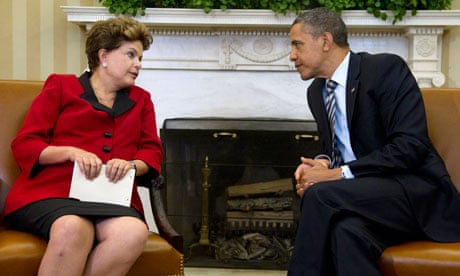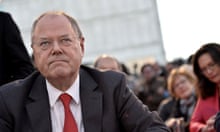The Brazilian president, Dilma Rousseff, snubbed Barack Obama on Tuesday by postponing an official visit to Washington in protest at the spying activities of the US National Security Agency.
The row between the biggest economies in North and South America was the latest diplomatic fallout from the top-secret documents leaked by US whistleblower Edward Snowden. In August, Obama announced he was pulling out of a bilateral meeting with the Russian president, Vladimir Putin, over Moscow's decision to grant asylum to Snowden.
Despite a last-minute call from Obama, Rousseff's office released a statement saying the political environment was not amenable for the planned trip on 23 October.
"Given the proximity of the scheduled state visit to Washington and in the absence of a timely investigation … there aren't conditions for this trip to be made," the statement read. "The Brazilian government is confident that when the question is settled in an adequate manner, the state visit can quickly occur."
A statement from the White House said: "The president has said that he understands and regrets the concerns disclosures of alleged US intelligence activities have generated in Brazil and made clear that he is committed to working together with President Rousseff and her government in diplomatic channels to move beyond this issue as a source of tension in our bilateral relationship.
"As the president previously stated, he has directed a broad review of US intelligence posture, but the process will take several months to complete.
"For this reason, the presidents have agreed to postpone President Rousseff's state visit to Washington scheduled for October 23."
The postponement followed reports that the NSA has monitored Rousseff's telephone calls and emails, spied on communications by her aides and targeted Brazil's biggest company, Petrobras.
Rousseff had earlier requested an explanation from Obama, but his reassurances failed to satisfy her concerns.
The announcement is at least a setback to bilateral relations, which appeared to have been improving since Rousseff came to power in 2011. She was the only foreign leader this year to be invited to a state dinner at the White House and business executives planned to use the visit to sign deals on oil exploration and fighter jet sales.
But details of US spying activities in Brazil enraged public opinion. Based on leaked NSA files, Guardian journalist Glenn Greenwald and Globo – Brazil's biggest news group – revealed earlier this month that the NSA ran surveillance programmes on Rousseff and her aides. A week later, Greenwald (who is based in Rio de Janeiro) and Globo disclosed slides showing that the US spy agency targets Petrobras, the state-run energy company that controls some of the world's biggest untapped oil supplies.
Earlier reports had shown that Brazil is among several countries that are subject to massive communications data monitoring by the US.
Unease about US activities has also been raised by the diversion of a plane carrying Bolivian president Evo Morales because it was suspected of carrying Snowden and the detention of Greenwald's Brazilian partner David Miranda at Heathrow airport.
Former president Luiz Inácio Lula da Silva said Obama should apologise to the world. Justice minister Jose Eduardo Cardozo said the reports, if confirmed, "should be considered very serious and constitute a clear violation of Brazilian sovereignty".
In response, US officials have adopted a softer tone. US national security adviser Susan Rice said the reports raised "legitimate questions for our friends and allies". But the White House has stopped short of the explanations and apologies requested by Brazil.










Comments (…)
Sign in or create your Guardian account to join the discussion